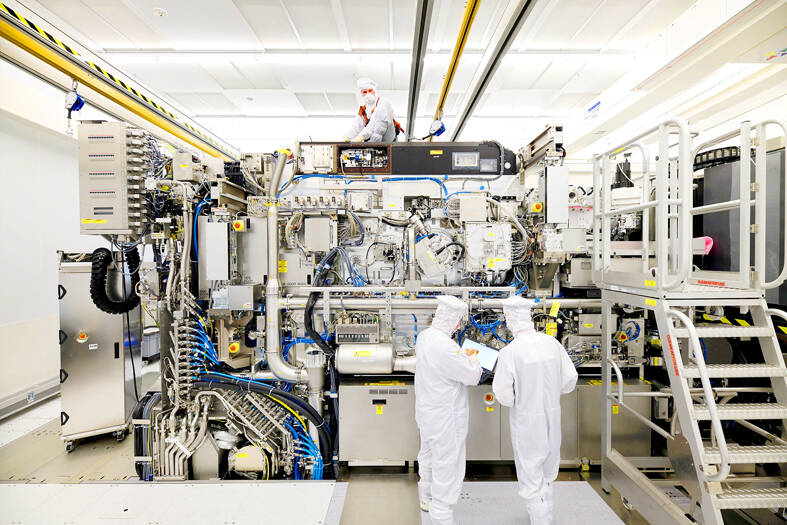China’s purchases of machines to make computer chips last month fell to their lowest level in more than two years, hammered by cratering electronics demand and new US export restrictions that are limiting the ability of Chinese firms to buy the most advanced equipment.
Chinese firms imported US$2.3 billion of machines used in semiconductor manufacturing last month, down by more than 40 percent from a year earlier to the lowest level since May 2020, according to customs data released on Wednesday.
Imports from the six major supplying nations, including the US, Japan and the Netherlands, all fell at a double-digit pace in the month, even before some of those nations agreed to join the US in further limiting shipments of the most advanced gear to China.

Photo: Reuters
Imports of computer chips also fell as makers of semiconductors for smartphones and PCs struggle with plummeting demand for their products less than a year after being unable to produce enough to meet orders.
The US sanctions announced in October have caused major foreign firms to limit or cease the supply to Chinese companies of equipment to make the most advanced chips, although machines used to make older and slower chips can still be shipped.
The US is negotiating with the Dutch and Japanese governments to convince them to join its unilateral sanctions, with people with knowledge of those talks telling Bloomberg that they are likely to adopt at least some of the sweeping measures of the US.
The three-country alliance would represent a near-total blockade of China’s ability to buy the equipment necessary to make leading-edge chips.
The US rules restricted the supply from US suppliers Applied Materials Inc, Lam Research Corp and KLA Corp.
Japan’s Tokyo Electron Ltd and Dutch lithography specialist ASML Holding NV are the two other critical suppliers that the US needs to make the sanctions effective, so if their governments adopt the curbs too, it would be a significant victory in the US attempt to cripple the development of China’s semiconductor industry.
China has filed a complaint with the WTO to try and overturn the export controls, although any decision on that would likely take years to be decided.
The trade data also showed that China’s purchases of computer chips were down by about 26 percent last month for a 2 percent decline in the first 11 months of this year.
Chinese demand for chips has been weak this year due to supply chain disruptions, a slowing domestic economy and falling demand globally for products such as smartphones.

POWERING UP: PSUs for AI servers made up about 50% of Delta’s total server PSU revenue during the first three quarters of last year, the company said Power supply and electronic components maker Delta Electronics Inc (台達電) reported record-high revenue of NT$161.61 billion (US$5.11 billion) for last quarter and said it remains positive about this quarter. Last quarter’s figure was up 7.6 percent from the previous quarter and 41.51 percent higher than a year earlier, and largely in line with Yuanta Securities Investment Consulting Co’s (元大投顧) forecast of NT$160 billion. Delta’s annual revenue last year rose 31.76 percent year-on-year to NT$554.89 billion, also a record high for the company. Its strong performance reflected continued demand for high-performance power solutions and advanced liquid-cooling products used in artificial intelligence (AI) data centers,

SIZE MATTERS: TSMC started phasing out 8-inch wafer production last year, while Samsung is more aggressively retiring 8-inch capacity, TrendForce said Chipmakers are expected to raise prices of 8-inch wafers by up to 20 percent this year on concern over supply constraints as major contract chipmakers Taiwan Semiconductor Manufacturing Co (TSMC, 台積電) and Samsung Electronics Co gradually retire less advanced wafer capacity, TrendForce Corp (集邦科技) said yesterday. It is the first significant across-the-board price hike since a global semiconductor correction in 2023, the Taipei-based market researcher said in a report. Global 8-inch wafer capacity slid 0.3 percent year-on-year last year, although 8-inch wafer prices still hovered at relatively stable levels throughout the year, TrendForce said. The downward trend is expected to continue this year,

Vincent Wei led fellow Singaporean farmers around an empty Malaysian plot, laying out plans for a greenhouse and rows of leafy vegetables. What he pitched was not just space for crops, but a lifeline for growers struggling to make ends meet in a city-state with high prices and little vacant land. The future agriculture hub is part of a joint special economic zone launched last year by the two neighbors, expected to cost US$123 million and produce 10,000 tonnes of fresh produce annually. It is attracting Singaporean farmers with promises of cheaper land, labor and energy just over the border.

US actor Matthew McConaughey has filed recordings of his image and voice with US patent authorities to protect them from unauthorized usage by artificial intelligence (AI) platforms, a representative said earlier this week. Several video clips and audio recordings were registered by the commercial arm of the Just Keep Livin’ Foundation, a non-profit created by the Oscar-winning actor and his wife, Camila, according to the US Patent and Trademark Office database. Many artists are increasingly concerned about the uncontrolled use of their image via generative AI since the rollout of ChatGPT and other AI-powered tools. Several US states have adopted